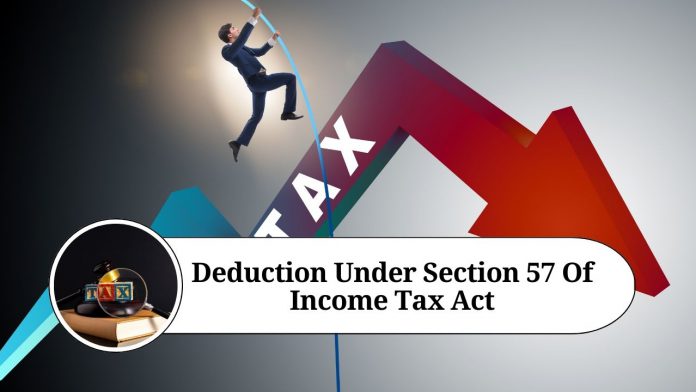The Income Tax Act, of 1961, provides several deductions to taxpayers for the expenses incurred in earning taxable income. Section 57 of the Income Tax Act deals with the deduction of expenses for the earning of income other than salary. This section allows taxpayers to claim deductions for expenses incurred for earning income from sources such as rent, interest, dividends, and other sources. In this article, we will discuss the provisions of Section 57 and how it works.
Deduction for expenses incurred for earning income:
Under subsection (i) of Section 57, taxpayers are allowed to claim a deduction for expenses incurred to earn income other than salary. This deduction is available for the following types of income:
- Income from house property: Taxpayers who own a house property and receive rental income from it can claim a deduction for expenses incurred to earn the rental income. These expenses may include interest paid on a housing loan, municipal taxes, repair and maintenance expenses, insurance premiums, and depreciation.
- Income from business or profession: Taxpayers who earn income from business or profession can claim a deduction for expenses incurred to earn the income. These expenses may include rent paid for the office, salaries and wages paid to employees, expenses incurred for the purchase of raw materials, and expenses incurred for advertising and marketing.
- Income from other sources: Taxpayers who earn income from other sources such as interest, dividends, or royalties can claim a deduction for expenses incurred to earn the income. These expenses may include bank charges, brokerage fees, and fees paid to professionals such as lawyers and accountants.
It is important to note that the expenses claimed as a deduction must be wholly and exclusively incurred to earn income. If the expenses are not incurred wholly and exclusively to earn income, then they cannot be claimed as a deduction.
Deduction for interest paid on money borrowed for investment:
Under subsection (ii) of Section 57, taxpayers are allowed to claim a deduction for interest paid on money borrowed to invest in assets that generate income. This deduction is available for the following types of income:
- Income from house property: Taxpayers who have borrowed money for the purpose of acquiring or constructing a house property and earn rental income from it can claim a deduction for interest paid on the borrowed money.
- Income from business or profession: Taxpayers who have borrowed money to invest in their business or profession and earn income from it can claim a deduction for interest paid on the borrowed money.
It is important to note that the deduction for interest paid on money borrowed for investment is only available if the borrowed money is used to invest in assets that generate income. If the borrowed money is not used for this purpose, then the deduction cannot be claimed.
Conclusion:
In conclusion, Section 57 of the Income Tax Act provides deductions for expenses incurred in the earning of income other than salary. Taxpayers can claim a deduction for expenses incurred to earn income and for interest paid on money borrowed for investment.
However, it is important to ensure that the expenses claimed as a deduction are wholly and exclusively incurred to earn income and that the borrowed money is used to invest in assets that generate income. Taxpayers must also maintain proper records of the expenses incurred and the interest paid on borrowed money to claim these deductions.
It is essential to understand the provisions of Section 57 to claim the deductions correctly and avoid any penalties for incorrect claims. Taxpayers should also seek the help of a tax professional to ensure that they claim all the deductions available to them under Section 57.



















